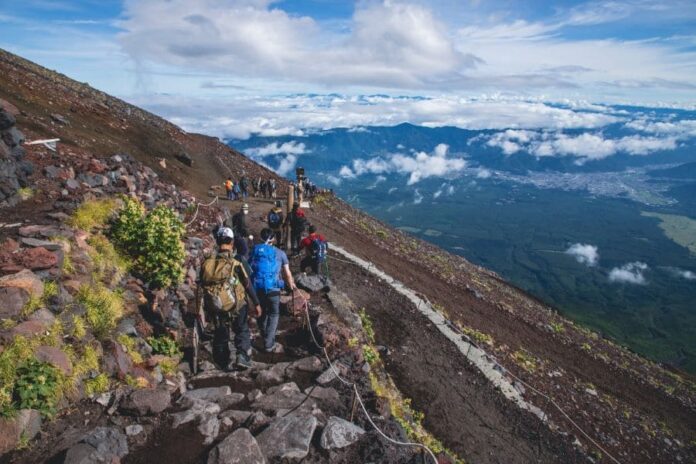Conquering Mount Fuji – the very best mountain and majestic image of Japan – is the dream of many individuals who love mountaineering and yearn to expertise the majestic surroundings. With spring coated with cherry blossoms and autumn with good crimson leaves, Mount Fuji is a spot that pulls vacationers because of its splendid pure surroundings. Be a part of Journey 5 Chau to find distinctive experiences when climbing Mount Fuji and a few experiences to assist make the conquering journey secure and pleasing!
1. The place is Mount Fuji situated?
Mount Fuji with an altitude of three,776.24 meters is the very best mountain in Japan, situated on Honshu island and stretching throughout Yamanashi and Shizuoka provinces, about 100km southwest of Tokyo. To climb the mountain, you possibly can select one in every of 5 important routes: Gotemba, Fuji-Yoshida, Kawaguchiko, Fujinomiya and Subashiri. On common, the journey to the highest of the mountain lasts from 5-9 hours, relying on the pace and route you select.

2. Ultimate time to begin the journey to beat Mount Fuji
The best time to climb Mount Fuji in Japan is from early July to late August. That is the time when the climate is hotter and safer for climbers. Nevertheless, climate circumstances can change shortly, so it’s best to monitor climate data and mountain opening hours to rigorously put together to your journey. It’s best to keep away from climbing exterior the allowed time as a result of the mountain terrain is sort of harmful and accidents can simply happen as a consequence of fog and storms.
Every season of the 12 months, Mount Fuji places by itself magnificence, attracting guests with its spectacular altering surroundings. Collectively Journey 5 Continents Admire the fantastic thing about the 4 seasons at Mount Fuji!

See extra: Which season is finest to journey to Japan? Expertise the fantastic thing about 4 seasons
2.1. Mount Fuji in spring – The good fantastic thing about cherry blossoms
Spring is the time when cherry blossoms bloom across the foothills of Mount Fuji, creating lovely and poetic surroundings. From late March to mid-April, you possibly can take pleasure in rows of good cherry blossom bushes, particularly at close by Lake Kawaguchi, the place the picture of Mount Fuji is mirrored within the shimmering water. That is the best time for many who love images and wish to benefit from the recent air and peaceable surroundings of Japanese spring.

2.2. Mount Fuji summer time – The busiest climbing season
Summer season (July – August) is the official climbing season, when favorable climate circumstances and heat temperatures make the journey extra nice. That is additionally the time when the routes to the highest of the mountain are opened, welcoming hundreds of vacationers. The air on the mountain remains to be fairly cool, though it may be scorching on the foot of the mountain.
Within the early morning, you even have the chance to admire the dawn on the highest of the mountain – a fantastic second known as Goraiko, symbolizing a brand new starting and luck in Japanese tradition.

2.3. Mount Fuji in autumn – The good crimson colour of maple leaves
Within the fall, from September to November, Mount Fuji places on the crimson and yellow coat of maple leaves, making a romantic and charming scene. This can be a nice time to view the mountains from afar, as the autumn colours spotlight their magnificence. The forests across the foot of the mountain, particularly Aokigahara forest, additionally turn out to be colourful, attracting vacationers to go to and take photographs.
Nevertheless, because the climate begins to get chilly and climbing routes are formally closed, it’s good to plan rigorously if you wish to take part in brief climbing journeys.

2.4. Mount Fuji in winter – White snow covers the majestic mountain peak
Winter, from December to February, is when Mount Fuji is roofed with white snow, creating an impressive and delightful scene. Though it’s not climbing season as a consequence of harsh and harmful climate, this is a perfect time to view the mountain from afar, particularly from the Lake Kawaguchi space and Arakurayama Sengen Park, the place the floating Chureito pagoda is situated. well-known for its lovely surroundings when Mount Fuji seems amidst the white snow. The chilly local weather makes the air recent and quiet, bringing a way of tranquility typical of Japanese winters.
From cherry blossom season to the snow-capped peak, every season brings a brand new look to Mount Fuji, making it a really perfect year-round vacation spot for many who wish to discover Japanese nature and tradition.

3. Standard routes to Mount Fuji
There are 5 important climbing routes, however the most well-liked are Yoshida and Subashiri, every providing distinctive experiences:
3.1. Yoshida Route – Route for newbies
Yoshida is the most well-liked route, particularly for inexperienced persons, as there are numerous facilities and motels alongside the way in which. To succeed in the highest of the mountain by way of this route, it should take you about 6 hours to climb and three.5 hours to descend, ranging from Fuji Subaru No. 5 station. This can be a crowded route, particularly throughout peak season, so it’s good to reserve time if you wish to watch the dawn or sundown from the highest of the mountain.
Yoshida route particulars:
– Departure level: Fuji Subaru fifth Station, simply accessible by native or categorical bus.
– Journey to the highest: The climb from station 7 to station 8 is often the longest, with steep and rocky terrain. The part from Station 8 to the highest can also be crowded, so save additional time if you wish to watch the sundown or dawn.
– Journey down the mountain: When getting off, it’s good to take note of the highway indicators at station 8 to observe the proper Yoshida path to station 5.

3.2. Subashiri route – Alternative for individuals who like quiet house and sightseeing
Subashiri is a much less widespread alternative, appropriate for many who wish to take pleasure in a quiet house. This route begins from Subashiri Station No. 5 and takes about 7 hours to climb and about 4 hours to descend. This route primarily goes by areas with many bushes and isn’t too crowded.
Subashiri route particulars:
– Departure level: Subashiri Station 5, you may get right here by bus from Gotemba station or free shuttle from Subashiri multipurpose sq..
– Journey to the highest: The primary half of the highway goes by cool, dense forests, creating a nice feeling. The highway from station 8 to the highest will merge with the Yoshida path, inflicting some congestion, however in return, the encircling surroundings is picturesque.
– Journey down the mountain: When getting off, you simply want to concentrate to the highway indicators at station 8 to return to the unique Subashiri path to station 5.

4. Some helpful notes for the journey to beat Mount Fuji
The next are helpful notes from Journey 5 Continents will assist your journey to beat Mount Fuji safer and extra full.
4.1. Put together sufficient meals, water and heat garments
When climbing Mount Fuji in July-August, the temperature on the high can drop as little as 9.3°C to three.6°C, so it’s good to convey sufficient heat garments. It’s best to put together dry meals and about 3 liters of water to replenish the physique's power.
4.2. Equip gloves, hats and appropriate climbing sneakers
A pair of anti-slip gloves and specialised climbing sneakers will maintain you safer in harsh climate circumstances. Don't overlook a hat to guard towards the solar and chilly wind within the mountains.

4.3. Deliver drugs and fundamental medical provides
The local weather within the mountains will be uncomfortable for climbers, particularly these coming from scorching climates. Put together some fever reducers, chilly drugs and small quantities of oxygen. Band-aids are additionally essential to cope with sudden conditions.
4.4. Climbing in teams
You shouldn’t climb the mountain alone as a result of the terrain of Mount Fuji is sort of rugged and it’s simple to get misplaced. Touring in teams is safer if an emergency happens.

4.5. Bogs can be found for a charge
Bogs on the way in which up Mount Fuji cost round 200-300 yen per use, so it’s best to put together change.
With an altitude of almost 4,000 meters, Mount Fuji isn’t solely a logo of Japan but additionally a really perfect vacation spot for many who like to discover. The journey to beat the majestic pure surroundings of Mount Fuji will certainly depart you with memorable experiences.
See extra: Sharing self-sufficient journey experiences in Japan from A to Z



